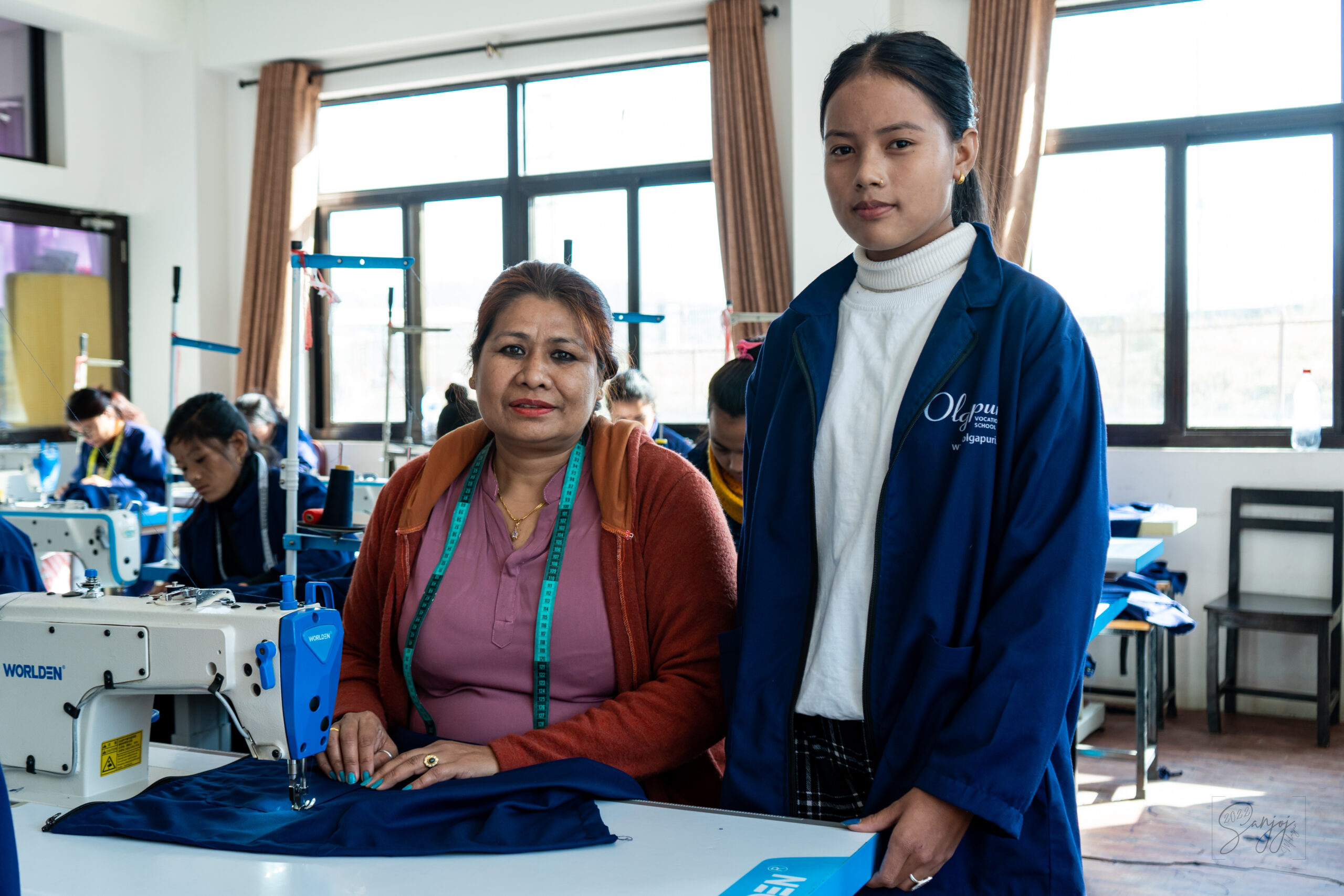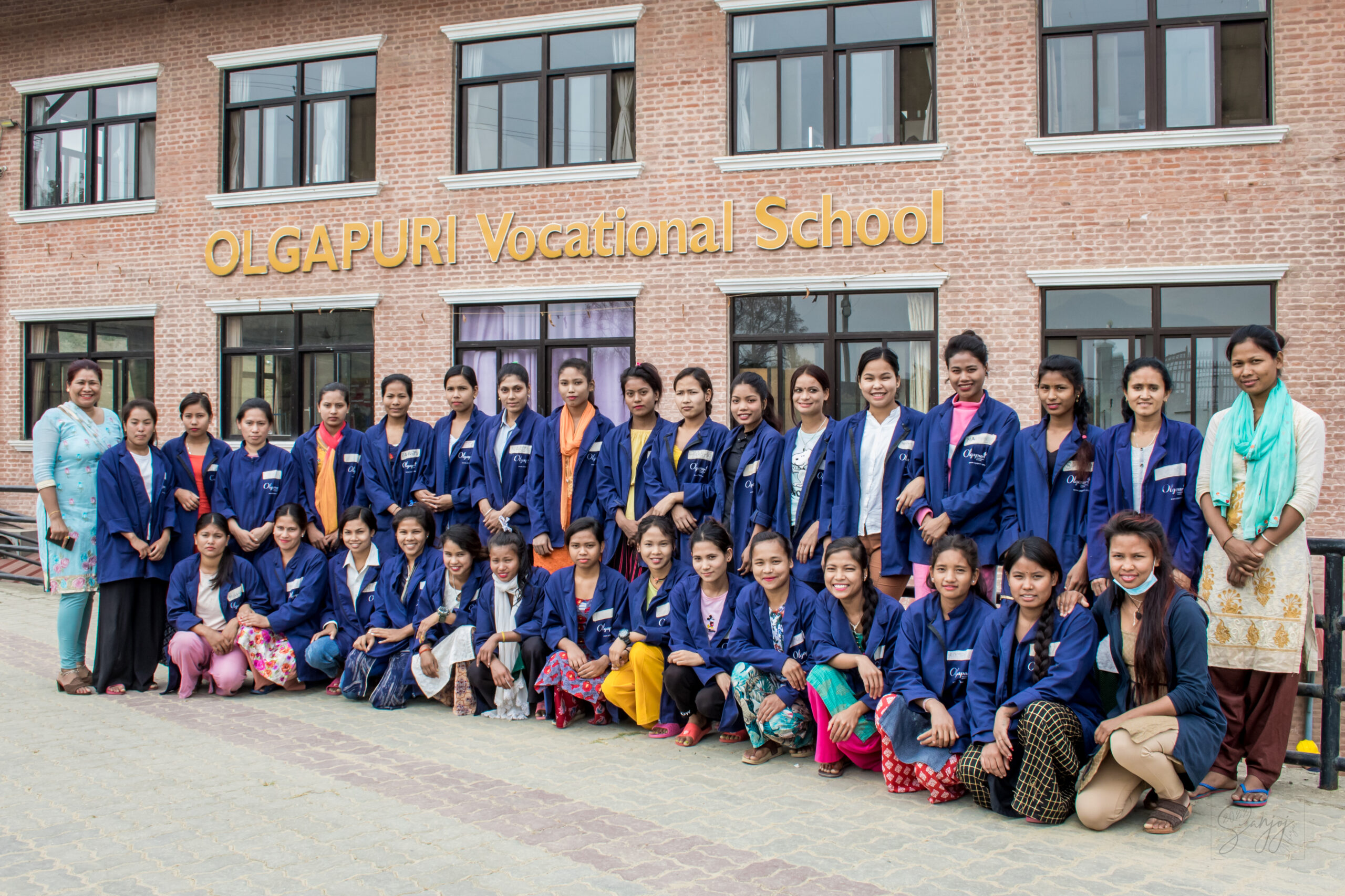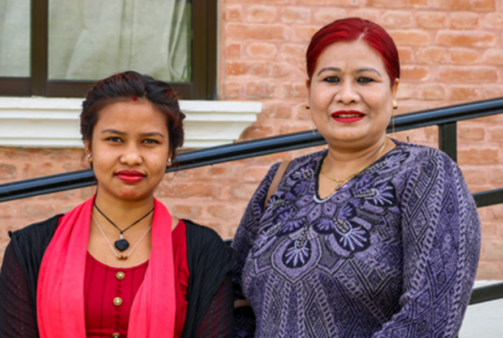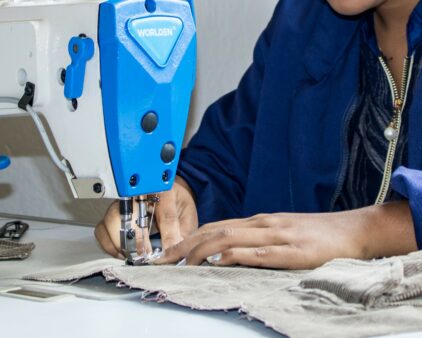Month: January 2023
Industrial Tailoring at Olgapuri Vocational School

Industrial Tailoring has quickly become one of Olgapuri Vocational School’s most popular courses for women. The average monthly wage for our graduates is 30,000 rupees per month ($260), with room to grow. Those with more experience are making as much as 45,000 rupees ($390)—over three times Nepal’s minimum wage!
Over the past year, our team has had conversations with uneasy supporters about our new Industrial Tailoring vocational training course, which is held exclusively for women.
We’re hearing two main concerns:
- “Sewing is traditionally undervalued as ‘women’s work’. Shouldn’t we be trying to encourage young women to break free of these sorts of industries, rather than continuing this pattern?”
- “Isn’t the garment / textile industry particularly dangerous and exploitative? I don’t want my donations to go towards placing these bright young women into sweatshops!”
Maybe you’ve had similar concerns! In fact, people on the global team and on the board have discussed these same worries. At NYF, we deeply appreciate how thoughtful our supporters are, and how engaged you are in looking out for the children and youth we serve.
Our Commitment to Women’s Empowerment
First and foremost, our global team is committed to empowering women to follow their dreams. This is especially the case when their options are limited because of entrenched gender roles and hierarchies. We believe every girl and every woman should be free and safe to choose her own destiny!
We’re also appalled by the conditions within many of the world’s factories—not just garment factories. No one on our team wants to see any one of our beneficiaries trapped in an oppressive, unsafe working environment.

All Olgapuri Vocational School courses are openly advertised as available for all genders. At the orientation presentations where young people are given application options, women are always strongly encouraged to apply. Some of the instructors for these courses are women, giving potential students clear evidence that women are welcome.
However, despite all this, NYF has struggled to interest young women in signing up for these opportunities. As a result, enrollment in these programs is overwhelmingly male (a staggering 90%).
Our team has been working for several years to understand this phenomenon and to provide good solutions. Young women know they are welcome to apply for these courses in male-dominated career fields.
But many of these young women still don’t feel safe in those industries.
NYF can place female construction graduates in positions where we know they will be hired, paid equitably, and respected by their employers. Unfortunately, we can’t guarantee that they will not experience sexual harassment and other sexist aggression in the workplace.
Many young women don’t want to walk that challenging path, even if it pays more. They just want to make a decent living, gaining personal economic freedom without entering a career where conditions simply won’t feel safe for them as women. We can’t fault them for that.
Former Kamlaris Propose Industrial Tailoring Course
Olgapuri Vocational School’s Industrial Tailoring course was proposed by a group of former kamlaris. This initial group of young women met one another in a women’s empowerment group run by the Former Kamlaris Development Forum (FKDF). (The FKDF is a community-based nonprofit NYF helped found in the Tharu communities impacted by the traditional kamlari practice.)
In a group discussion, several of these women shared that they wished NYF offered a course in Industrial Tailoring. It seemed strange to them that this course wasn’t available. After all, they reasoned: clothing is one of Nepal’s biggest exports, and the job market in this area is growing. Careers in this field are stable, well-paying, and have room for growth and flexibility.
Even knowing that women were encouraged to apply for the construction training programs, some of these women almost felt left out by OVS because we weren’t offering trainings in the career fields most likely to attract female engagement.
The freedom to choose among a set of only male-dominated options just didn’t feel like real freedom.
Fortunately, these empowered young women knew they could ask NYF directly about such an option. They also had a growing group of women behind them who all agreed they’d leap at the chance to earn their certifications in Industrial Tailoring.
When this group approached NYF, our team let them know the common concerns about workplace dangers in the garment industry. The young women responded that construction trades are also dangerous. They all knew someone who had experienced an electrical accident or been injured by a power tool. And as far as exploitation was concerned, these young women had already survived kamlari bondage. They know better than most that bad actors exist in all industries.
Thanks to NYF and the FKDF, though, they also possess the extraordinary inner tools that empower them to defend themselves from exploitation—and motivate them to defend their sisters as well.
Their request was so powerful and enthusiastic that our team had to find a way to provide this opportunity.
The Curriculum
NYF’s team made connections with local high-quality garment factories known for their fair practices and safe working conditions. They asked for their guidance in creating an ideal classroom and for help developing a specialized curriculum. These experts shared a list of skills all their employees needed to master, as well as a list of “dream skills” that made tailors especially competitive in the workforce.
Being highly skilled in a trade is a major safeguard against exploitation in any industry. This is because it allows workers the flexibility to seek out better workplaces without risking financial ruin.
Our team designed a six-month course which would prepare trainees to create high-quality garments for local consumption as well as for international export. Importantly, the training also includes the information needed for a student to establish her own small clothing business.
The curriculum covers industrial machine operation and maintenance, different kinds of stitches and their uses, measurement skills, fabric types and their uses, clothing design principles, and how to take items from printed designs to fabric cutting to assembly and through to the finishing touches. Safety is always an important topic as well.
Trainees are given specialized life skills and group therapy sessions (and, where needed, personal therapy as well) through NYF’s Ankur Counseling Center.
They also participate in motivational sessions on women’s empowerment!
During the entire six-month course, trainees live in the Olgapuri Girls’ Hostel. This is a space created especially for young women in vocational training courses (many of whom are not familiar with city life) so they can feel safe and secure during their training.
The first four months of the training consist of classroom instruction, followed by two months of paid On-the-Job training in one of the city’s high-quality factories. This is a paid apprenticeship period, with pay being nearly double Nepal’s minimum wage.

Meena Kumari Chaudhary (left, Asst. Trainer) is a former kamlari—and she was also one of the earliest graduates of our Industrial Training program! She’s thrilled to be using the skills she learned here to empower more women to enter this growth industry.
Here, she is pictured with Lead Trainer Anju Thapa. Both women have become role models for the young women hoping to build a sustainable career in tailoring!
Workplace Safety
Unfortunately, sweatshops do exist in Nepal. These cramped factories regularly ignore laws and regulations, have extremely poor and unsafe working conditions, and have unscrupulous bosses who demand inhumane working hours and withhold pay. NYF would never partner with these organizations, let alone intentionally place a trainee in such a working environment.
Kathmandu is also home to factories where workers are treated fairly, paid well, and conduct their work in well-lit, airy spaces that are kept tidy, with wide paths for evacuating in an emergency, ensuring safety for everyone. These are the workplaces our graduates enter, as a group of empowered women determined to build their futures—and continue working towards a more equitable world.
Bindu’s Story

Bindu* has survived horrific ordeals over the past two years. During the COVID pandemic, she started dating an older man, against her parents’ wishes. Soon, this man convinced her to run away with him to start a new life in India. Dreaming of a beautiful future, Bindu followed him across the border. Bindu quickly learned that the man’s intention all along had been to traffic her.
Betrayed and heartbroken, Bindu relied on her inner strength to survive her situation—and she somehow managed to escape her captor and return to Nepal.
But the nightmare wasn’t over. When Bindu finally reached her home village, her parents rejected and disowned her.
Fortunately, Bindu found an organization working with women who have survived sex trafficking, and they helped her file a case against the man who trafficked her. Thanks to Bindu’s courage, he’s now in prison, where he can’t hurt any more girls and women.
Bindu found housing in a women’s shelter in Kathmandu as she prepared for her next steps. One of the staff members there heard about NYF’s new Industrial Tailoring program—and immediately thought of Bindu.
Bindu has taken to the Industrial Tailoring skillset extraordinarily well. For the first time since she ran away from home with a heart full of hope, Bindu feels like her dreams are truly within reach.
“I never thought I’d be able to acquire a skill that would pay me this much,” she says, adding, “Economic independence is very important to me, as I have no family to support me. The work environment is also safe and pleasant. The other girls and women that I work with have become like my family—and my greatest support system. I feel very fortunate to have had the opportunity to meet them and work with them.”
A long waiting list…
In the first year of its existence, the Industrial Tailoring course quickly became one of OVS’s most sought-after options. Our team has already trained 149 women—and there’s a long waiting list. Most of these women are former kamlaris from western Nepal, but we’ve also received numerous referrals from Kathmandu women’s shelters and other aid organizations. This training has already empowered single mothers, survivors of domestic violence and sexual abuse, and women who have escaped trafficking.
We are so grateful for the support that allows us to offer these women this remarkable opportunity. We hope to be able to continue offering it as long as young women are interested.
The Empowering Freed Kamlaris program is one of NYF’s greatest achievements. For more information on the former kamlaris and the FKDF, please visit https://nyf.news/efk